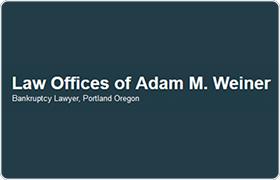Cornelius Bankruptcy Lawyer, Oregon
Sponsored Law Firm
-
 x
x

Click For More Info:
-
Law Offices of Adam M. Weiner
8624 SE 13th Ave Portland, OR 97202» view mapBankruptcy & Debt Premier Bankruptcy Attorney
Life doesn’t always have to be hard. Consult with a bankruptcy attorney who looks out for your best interests. Call today to begin the process for a fresh financial start.
503-719-5123
Includes: Bankruptcy Litigation, Commercial Bankruptcy, Consumer Bankruptcy, Dissolution
James E Zwaanstra
Family Law, Business & Trade, Commercial Bankruptcy, Bankruptcy
Status: In Good Standing Licensed: 28 Years
Colin Savoy
Securities, Business & Trade, Corporate, Commercial Bankruptcy
Status: Inactive Licensed: 24 Years
 Adam M. Weiner Portland, OR
Adam M. Weiner Portland, OR Practice AreasExpertise
Practice AreasExpertise
